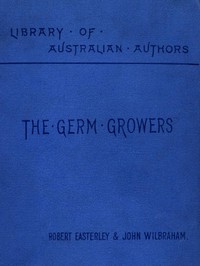The Germ Growers: An Australian story of adventure and mystery, Robert Potter [pdf e book reader txt] 📗

- Author: Robert Potter
Book online «The Germ Growers: An Australian story of adventure and mystery, Robert Potter [pdf e book reader txt] 📗». Author Robert Potter
I don’t think that I should ever have got over the dislike of him which I then conceived, but I saw the last of him, at least Penruddock saw the last of him, about three months later. I had been sitting looking over the sea between the pier and the cliffs and trying to catch a glimpse of the Wicklow Mountains which were sometimes to be seen from that point. Just then James Redpath came up from the beach beyond the pier, and passing me with a brief “good morning,” went away inland, leaving the cliffs behind him. I don’t know how long I lay there, it might be two [11] hours or more, and I think I slept a little. But I suddenly started up to find it high day and past noon, and I began to think of looking for some shelter. There was not a cloud visible, but nevertheless two shadows like, or something like, the shadows of clouds lay near me on the ground. What they were the shadows of I could not tell, and I was about to get up to see, for there was nothing to cast such a shadow within the range of my sight as I lay. Just then one of the shadows came down over me and seemed to stand for a moment between me and the sun. It had a well-defined shape, much too well defined for a cloud. I thought as I looked that it was just such a shadow as might be cast by a yawl-built boat lying on the body of a large wheelbarrow. Then the two shadows seemed to move together and to move very quickly. I had just noticed that they were exactly like one another when the next moment they passed out of my sight.
I started to my feet with a bound, my heart beating furiously. But there was nothing more to alarm the weakest. It was broad day. Houses and gardens were to be seen close at hand and in every direction but one, and in that direction there were three or four fishermen drawing their nets. But as I looked away [12] to the part of the sky where the strange cloudlike shadows had just vanished, I remembered with a shudder that other feature in common of the strange stories of which I told you just now. It was a feature that forcibly reminded me of what I had just witnessed. Sometimes in the later stories you would be told of a cloud coming and going in an otherwise cloudless sky. And sometimes in the elder stories you would be told of an invisible car, invisible but not shadowless. I used always to identify the shadow of the invisible car in the elder stories with the cloud in the later stories, the cloud that unaccountably came and went.
As I thought it all over and tried to persuade myself that I had been dreaming I suddenly remembered that James Redpath had passed by a few hours before, and as suddenly I came to the conclusion that I should never see him again. And certainly he never was again seen, dead or alive, anywhere in Wales or England. His father, and his uncle, and their families, continued to live about Penruddock, but Penruddock never knew James Redpath any more. Whether I myself saw him again or not is more than I can say with absolute certainty. You shall know as much as I know about it if you hear my story to the end.
THE RED SICKNESS.
Of course James Redpath’s disappearance attracted much attention, and was the talk not only of the village, but of the whole country-side. It was the general opinion that he must have been drowned by falling over the cliffs, and that his body had been washed out to sea. I proved, however, to have been the very last person to see him, and my testimony, as far as it went, was against that opinion. For I certainly had seen him walking straight inland. Of course he might have returned to the coast afterwards, but at least nobody had seen him return. I gave a full account of place and time as far as I could fix them, and I mentioned the queer-looking clouds and even described their shape. This, I remember, was considered to have some value as fixing my memory of the matter, but no further notice was taken of it. And I myself did not venture [14] to suggest any connection between it and Redpath’s disappearance, because I did not see how I could reasonably do so. I had, nevertheless, a firm conviction that there was such a connection, but I knew very well that to declare it would only bring a storm of ridicule upon me.
But a public calamity just then befell Penruddock which made men forget James Redpath’s disappearance. A pestilence broke out in the place of which nobody knew either the nature or the source. It seemed to spring up in the place. At least, all efforts to trace it were unsuccessful. The first two or three cases were attributed to some inflammatory cold, but it soon became clear that there were specific features about it, that they were quite unfamiliar, that the disease was extremely dangerous to life and highly infectious.
Then a panic set in, and I believe that the disease would soon have been propagated all over England and farther, if it had not been for the zeal and ability of two young physicians who happened very fortunately to be living in the village just then. Their names were Leopold and Furniss. I forget if I ever knew their Christian names. We used to call them Doctor Leopold and Doctor Furniss. They had finished their studies for some little time, but they found it advisable on the score [15] of health to take a longish holiday before commencing practice, and they were spending part of their holiday at Penruddock. They were just about to leave us when the disease I am telling you of broke out.
The first case occurred in a valley about two miles from the village. In this valley there were several cottages inhabited mostly by farm labourers and artisans. These cottages lay one after another in the direction of the rising ground which separated the valley from Penruddock. Then there were no houses for a considerable space. Then, just over the hill, there was another and yet another. The disease had made its way gradually up the hill from one cottage to another, day after day a fresh case appearing. Then there had been no new cases for four days, but on the fifth day a new case appeared in the cottage just over the brow of the hill. And when this became known, also that every case (there had now been eleven) had hitherto been fatal, serious alarm arose. Then, too, the disease became known as the “red sickness.” This name was due to a discoloration which set in on the shoulders, neck, and forehead very shortly after seizure.
How the two doctors, as we called them, became armed with the needful powers I do not know. They certainly contrived to obtain some sort of legal authority, [16] but I think that they acted in great measure on their own responsibility.
By the time they commenced operations there were three or four more cases in the valley, and one more in the second cottage on the Penruddock side. There was a large stone house, partly ruinous, in the valley, near the sea, and hither they brought every one of the sick. Plenty of help was given them in the way of beds, bedding, and all sorts of material, but such was the height which the panic had now attained that no one from the village would go near any of the sick folk, nor even enter the valley. The physicians themselves and their two men servants, who seemed to be as fearless and brave as they, did all the work. Fortunately, the two infected cottages on the Penruddock side were each tenanted only by the person who had fallen ill, and the tenant in each case was a labourer whose work lay in the valley. The physicians burnt down these cottages and everything that was in them. Then they established a strict quarantine between the village and the valley. There was a light fence running from the sea for about a mile inland, along the brow of the rising ground on the Penruddock side. This they never passed nor suffered any one to pass, during the prevalence of the sickness. Butchers and [17] bakers and other tradesmen left their wares at a given point at a given time, and the people from the valley came and fetched them.
The excitement and terror in Penruddock were very great. All but the most necessary business was suspended, and of social intercourse during the panic there was next to none. Ten cases in all were treated by the physicians, and four of these recovered. The last two cases were three or four days apart, but they were no less malignant in character: the very last case was one of the fatal ones. I learned nothing of the treatment; but the means used to prevent the disease spreading, besides the strict quarantine, were chiefly fire and lime. Everything about the sick was passed through the fire, and of these everything that the fire would destroy was destroyed. Lime, which abounded in the valley, was largely used.
A month after the last case the two physicians declared the quarantine at an end, and a month later all fear of the disease had ceased. And then the people of the village began to think of consoling themselves for the dull and uncomfortable time they had had, and of doing some honour to the two visitors who had served the village so well. With this double purpose in view a picnic on a large scale was organized, and [18] there was plenty of eating and drinking and speech-making and dancing, all of which I pass over. But at that picnic I heard a conversation which made a very powerful impression on me then, and which often has seemed to provide a bond which binds together all the strange things of which I had experience at the time and afterwards.
In the heat of the afternoon I had happened to be with Mr. Leopold and Mr. Furniss helping them in some arrangements which they were making for the amusement of the children who took part in the picnic. After these were finished they two strolled away together to the side of a brook which ran through the park where we were gathered. I followed them, attracted mainly by Mr. Furniss’s dog, but encouraged also by an occasional word from the young men. At the brook Mr. Furniss sat upon a log, and leaned his back against a rustic fence. The dog sat by him; a very beautiful dog he was, black and white, with great intelligent eyes, and an uncommonly large and well-shaped head. He would sometimes stretch himself at length, and then again he would put his paw upon his master’s shoulder and watch Mr. Leopold and me.
Mr. Leopold stood with his back to an oak-tree, and [19] I leant against the fence beside him listening to him. He was a tall,





Comments (0)